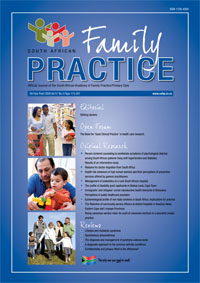Person centred counselling to ameliorate symptoms of psychological distress among South African patients living with hypertension and diabetes: Results of an intervention study
Keywords:
intervention studies, depression, anxiety
Abstract
Background Previous research internationally and within South Africa suggests that symptoms of depression and anxiety are prevalent among patients living with a chronic illness. Very few behavioural interventions have shown to be effective in ameliorating such symptoms among patients attending public health clinics in South Africa. In this study a five-session counselling programme was tested to ameliorate symptoms of depression and anxiety among clinic patients living with diabetes and hypertension in the Western Cape, South Africa. Method A convenience sample of patients (n=37) was recruited from two public clinics, non-randomly assigned to a treatment group (n=20) and a control group (n=17), and assessed before and after the intervention was presented. A battery of instruments consisting of the Hopkins Symptom Checklist, the Beck Depression Inventory, and the Beck Anxiety Inventory was administered before and after the intervention. Results The results indicate that person-centred counselling was effective in ameliorating general psychological distress, symptoms of depression, but not symptoms of anxiety as measured by the above instruments. The results suggest that psychological counselling may be helpful to medical patients. Conclusions While counselling interventions may be well-placed in public health settings from the perspective of treatment efficacy, it is necessary to temper this recommendation with an understanding of the barriers to implementing such services the resulting impact on therapeutic effectiveness.
Published
2009-04-25
Section
Original Research
By submitting manuscripts to SAFP, authors of original articles are assigning copyright to the South African Academy of Family Physicians. Copyright of review articles are assigned to the Publisher, Medpharm Publications (Pty) Ltd, unless otherwise specified. Authors may use their own work after publication without written permission, provided they acknowledge the original source. Individuals and academic institutions may freely copy and distribute articles published in SAFP for educational and research purposes without obtaining permission.

